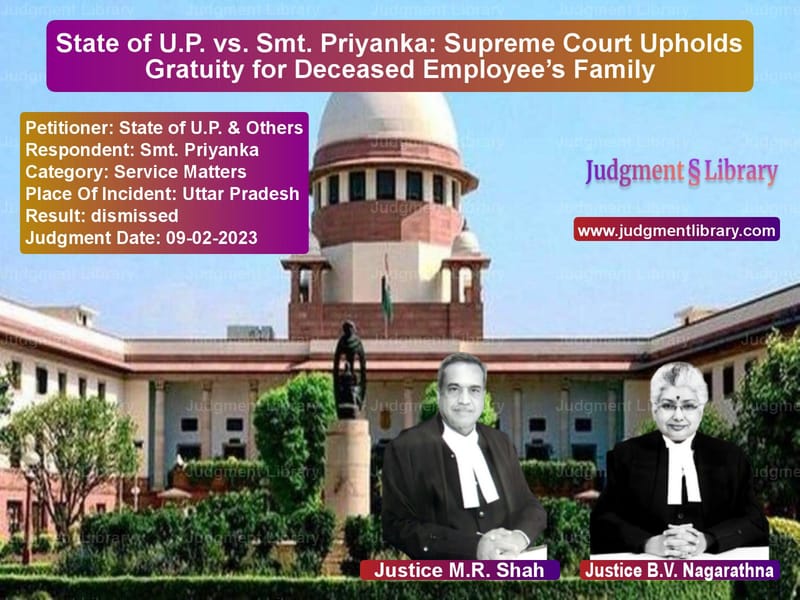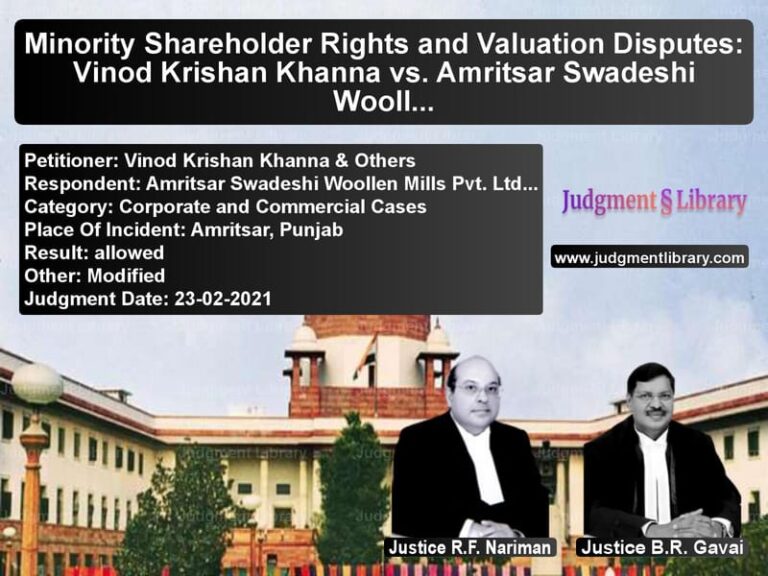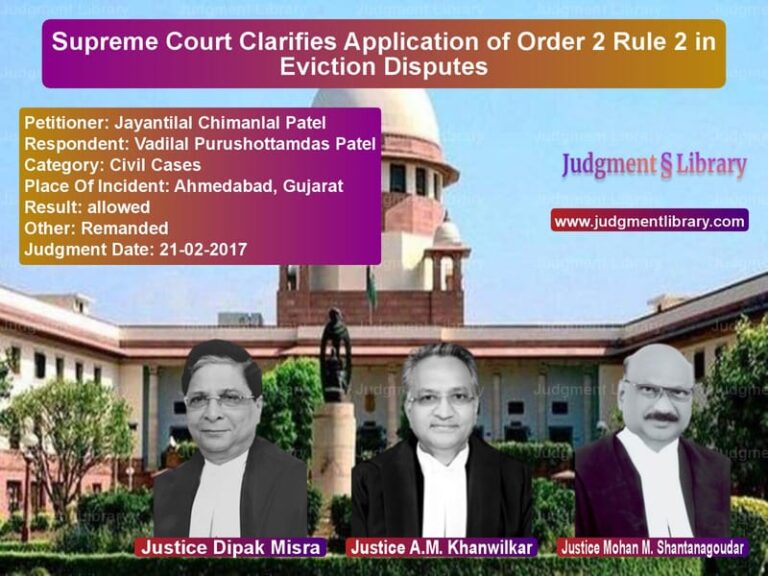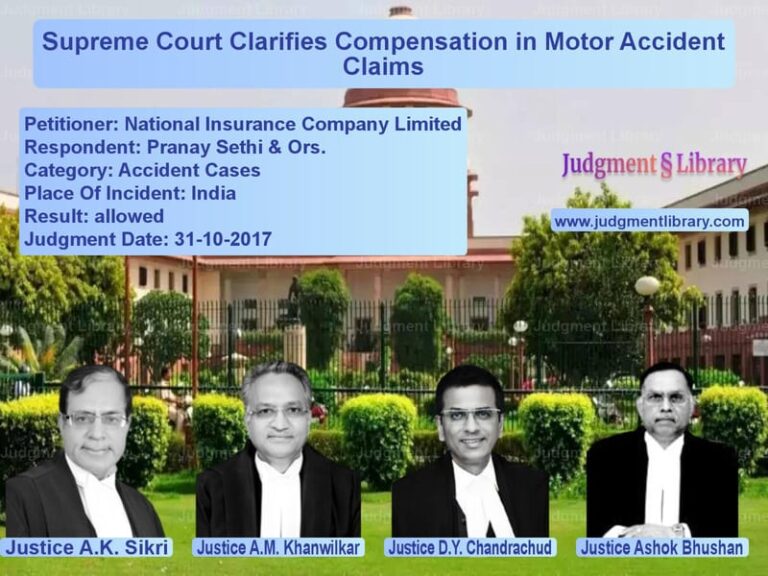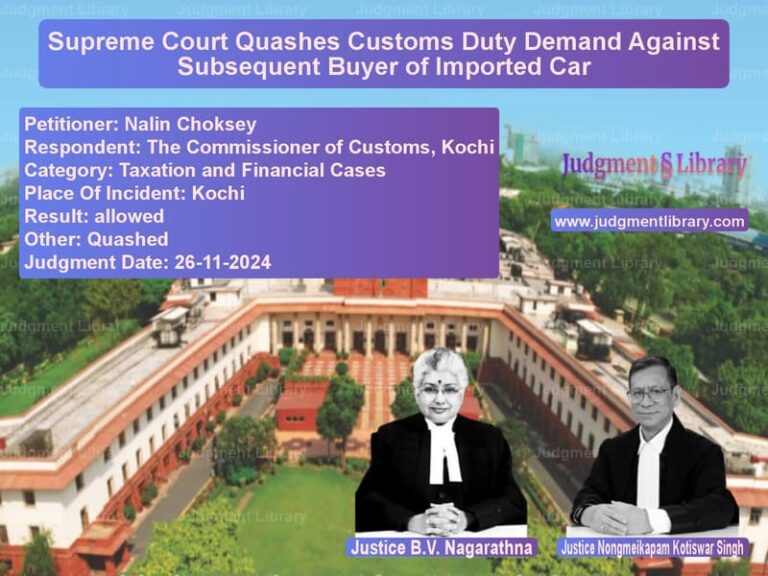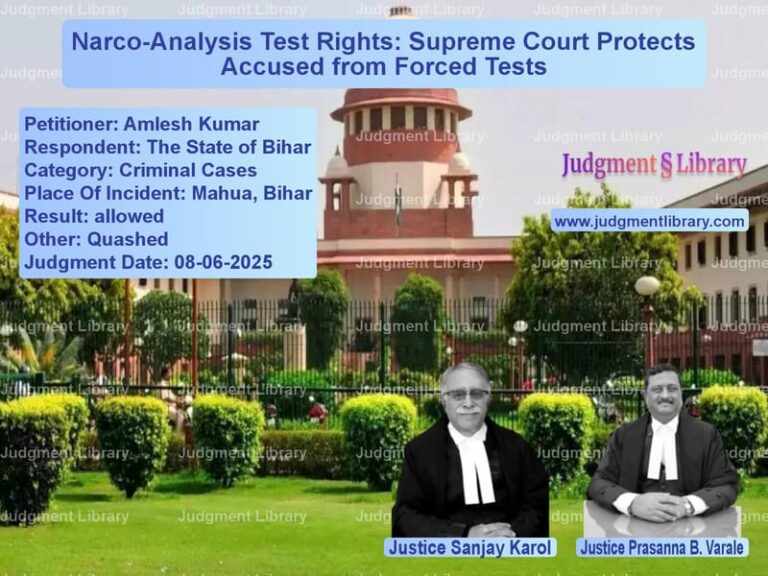State of U.P. vs. Smt. Priyanka: Supreme Court Upholds Gratuity for Deceased Employee’s Family
The Supreme Court of India recently delivered a significant ruling in the case of State of U.P. & Others vs. Smt. Priyanka, addressing the entitlement of gratuity for the family of a deceased government employee. The case revolved around whether an employee who passed away before opting for an extended retirement age should be denied the benefit of death-cum-retirement gratuity. The Court ruled in favor of the deceased employee’s family and imposed a cost on the State for unnecessary litigation.
Background of the Case
The case concerns Dr. Vinod Kumar, who was employed as a Lecturer in Uttar Pradesh. He joined service on July 2, 2001, and unfortunately passed away while in service on August 11, 2009. His widow, Smt. Priyanka, applied for gratuity benefits. However, the Uttar Pradesh government rejected the claim, arguing that her late husband had not opted for retirement at the age of 60 and was therefore ineligible for gratuity.
Smt. Priyanka challenged the government’s decision in the Allahabad High Court. The learned Single Judge ruled in her favor, stating that since her husband would have retired in 2026 had he opted for the extended retirement age, she was entitled to gratuity. The State of U.P. appealed this decision before the Division Bench, which upheld the ruling. Dissatisfied, the State of U.P. escalated the matter to the Supreme Court.
Arguments by the Petitioner (State of U.P.)
Represented by counsel Sanjay Kumar Tyagi, the State of U.P. argued:
- The deceased employee did not exercise his option for retirement at the age of 60, making him ineligible for gratuity.
- The existing government orders made opting for an extended retirement age a mandatory requirement to qualify for death-cum-retirement gratuity.
- The High Court erroneously granted the gratuity benefit despite the deceased employee’s failure to exercise this option.
Arguments by the Respondent (Smt. Priyanka)
On behalf of the deceased employee’s widow, the counsel argued:
- Dr. Vinod Kumar was entitled to opt for retirement at 60 as per the Government Order dated September 16, 2009.
- However, he passed away on August 11, 2009, before he could exercise this option.
- Since the last date to opt for extended retirement was July 1, 2010, denying him gratuity benefits based on his untimely demise was unjust.
- Gratuity is a benevolent scheme meant to provide financial support to the families of deceased employees, and denying the benefit due to a technicality contradicted the purpose of the scheme.
Supreme Court’s Judgment
The Supreme Court, after considering the arguments, ruled in favor of Smt. Priyanka. The key findings were:
- Dr. Vinod Kumar had not refused the option for retirement at 60; rather, he passed away before the deadline to opt in.
- It would be unfair to deny his family the benefit of gratuity when he would have been eligible had he lived.
- The government’s insistence on denying gratuity was against the spirit of benevolent schemes like death-cum-retirement gratuity.
- The appeal by the State of U.P. was frivolous and an unnecessary burden on the judicial system.
The Court firmly stated:
“The death-cum-retirement gratuity is a benevolent scheme and the same is extended to the respondent being the heir of the deceased employee by the learned Single Judge, confirmed by the Division Bench. In the facts and circumstances of the case, no interference of this Court is called for.”
Final Verdict
The Supreme Court ruled:
- The appeal by the State of U.P. was dismissed.
- The government must pay gratuity benefits to the respondent.
- A cost of Rs. 50,000 was imposed on the State for unnecessary litigation.
Implications of the Judgment
This ruling reinforces the principle that government schemes meant for the welfare of employees and their families should not be denied based on technicalities. Key takeaways from the judgment include:
- Protecting Employee Rights: Families of deceased government employees cannot be denied gratuity benefits due to procedural lapses.
- Discouraging Unnecessary Litigation: The Supreme Court’s imposition of costs on the State of U.P. serves as a deterrent against frivolous appeals.
- Benevolent Interpretation of Service Benefits: Government schemes like death-cum-retirement gratuity should be interpreted in a way that fulfills their intended purpose of supporting dependents.
This ruling ensures that the purpose of service benefits is upheld and that families of deceased employees receive their rightful entitlements without bureaucratic hurdles.
Petitioner Name: State of U.P. & Others.Respondent Name: Smt. Priyanka.Judgment By: Justice M.R. Shah, Justice B.V. Nagarathna.Place Of Incident: Uttar Pradesh.Judgment Date: 09-02-2023.
Don’t miss out on the full details! Download the complete judgment in PDF format below and gain valuable insights instantly!
Download Judgment: state-of-u.p.-&-othe-vs-smt.-priyanka-supreme-court-of-india-judgment-dated-09-02-2023.pdf
Directly Download Judgment: Directly download this Judgment
See all petitions in Pension and Gratuity
See all petitions in Employment Disputes
See all petitions in Public Sector Employees
See all petitions in Recruitment Policies
See all petitions in Disciplinary Proceedings
See all petitions in Judgment by Mukeshkumar Rasikbhai Shah
See all petitions in Judgment by B.V. Nagarathna
See all petitions in dismissed
See all petitions in supreme court of India judgments February 2023
See all petitions in 2023 judgments
See all posts in Service Matters Category
See all allowed petitions in Service Matters Category
See all Dismissed petitions in Service Matters Category
See all partially allowed petitions in Service Matters Category

